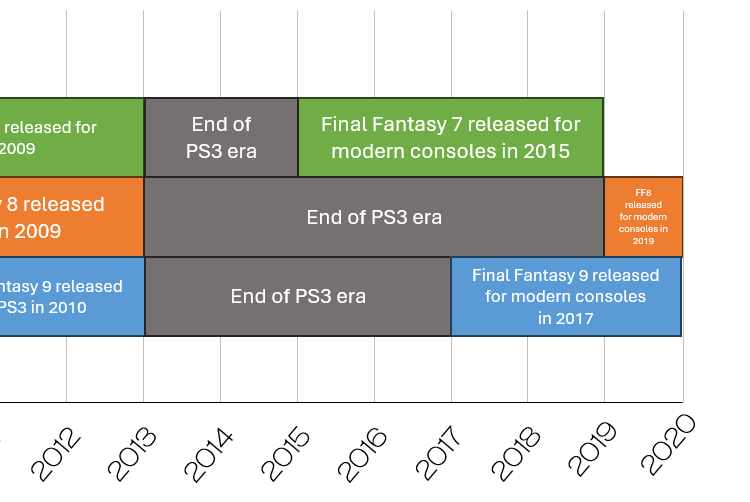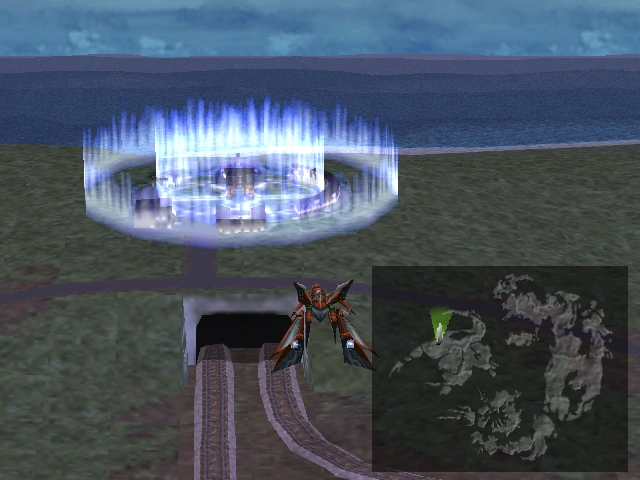I am convinced that one of the reasons Final Fantasy VIII hasn’t had a critical revival yet (with the exception of honorary brand ambassador Ben Starr) is that it wasn’t available on consoles during a critical transition period in the history of games.
Let me demonstrate this with a chart…

This is a timeline of the console availability* of Final Fantasy VII through IX in the United States. all released during the PS1 era. Even though the PlayStation 2 came out pretty shortly after the release of IX, the games were still widely available and easy to play on the PS2, which was backwards compatible with the previous console.
*As reader Avid Twin Peaks Enjoyer (good username) reminded me, these games were available in varying forms on Steam and mobile too. Notably, at least a version of FFVIII was on Steam in 2013, even thought it wasn’t great because it was missing the original soundtrack. For this post, I’m just focusing on the console releases because of the interesting trends in console game libraries that I think made a difference here. (Specifically, from 2013 onward, I’m looking at the modern remasters that have new quality-of-life features that make the games easier to play and more accessible. This is kind of arbitrary, but in the words of our lord and savior Squall, whatever.) I’ve edited some things in this post to reflect this; thanks for keeping me honest, readers!
Then we hit 2005. This is the year the Xbox 360 comes out, and even though the PS3 wouldn’t release until the following year, 2005 feels like the cutoff point where we notice a major shift. For this generation, Xbox was significantly more successful and widespread in America than the PlayStation 3. This is the point when many people changed ecosystem, breaking continuity with the PS1/PS2. I think, for hardcore gamers, this is the point when they stopped revisiting those titles.
I know that technically PS2 was still being sold during this period, and I think Square even kept printing PS1 copies of Final Fantasy VIII for a long time (there’s a Greatest Hits edition with the Square Enix logo on it rather than Square, which is weird!). In fact, there were still PS2 games in active development at this time, like Persona 3 and 4. But for the most part, people had moved on from the console at this point (as indicated by the damp squib of reception that the Personas got in the American press). This seems like an easy place to make a clean break and say the PS1 Final Fantasy games were no longer available.
The games are reissued for the PS3 in 2009–2010. That’s nice if you owned a PS3! At least in the United States, the console lagged behind the Wii and Xbox 360 in popularity for its entire run, but it was still an option for at least half the PlayStation 3’s lifespan. But chances are, you were not playing on PS3.
Now we reach the problem: 2013. This is where things get really interesting.

I hate getting caught up in console wars nonsense, but it’s widely agreed that Microsoft lost a ton of market share and support in the Xbox One era (I liked the Xbox One with Kinect, which is a separate topic that will not be addressed in this post). Phil Spencer, head of Xbox, acknowledged that this was “the worst generation to lose” because this was when we really started to see continuity in the digital distribution of games. This is the generation when players started to build a library of digital game licenses that they expected would be able to carry over with them across consoles, the way you can with PCs. And it’s true: I can still play Xbox One games I bought in 2013 on a Series X! It’s pretty great! Heck, I can even play a select library of Xbox 360 games on Series X!
But classic re-releases on PlayStation 3 did not get the same treatment. Once everyone jumped over to the PS4, the PS3 library may as well have stopped existing. If you’re under 30 and aren’t a retro obsessive type, you almost certainly have no way to play games on a system from before 2013. The era from 2013 onward is The Library of All Games as many people know it today.
During this era, Final Fantasy VII was available first. Even putting aside the PC re-release in 2012, FFVII was the first of these titles to hit PS4 in 2015, followed by everything else in the years after. The easy access to the game is, I think, one of the reasons for its longevity.
(Of course, that’s definitely not the reason for the game’s staying power. Final Fantasy VII has a much more outsized role on gaming culture than just the content of the game itself. The excitement around VII was enormous, and Square kept the momentum going with merchandising and franchising. See: Advent Children, Dirge of Cerberus, Crisis Core, a theme park ride, and all the other spin-offs. Final Fantasy VII, by itself, is a standalone brand in a way that Square never committed to with any other title. And most importantly, since 2005 when the game wasn’t easily available, Square has been interested in keeping that brand going, compared to, for instance, the less-than-popular sequel to Final Fantasy IV or its remakes.)
Naturally,VII got the remaster treatment first. Arguable, this is the first version people have actually wanted to play since the PS2 era, because its quality-of-life features, like being able to speed the game up or disable random encounters, things that make a huge-length RPG like this a little easier to digest.
Final Fantasy IX followed suit in 2017. Still a four-year gap in availability on consoles, but the game has been widely available for seven years now.
But poor, poor VIII. The rumor for a long time was that Square had lost the source code to Final Fantasy VIII. I don’t know if it’s true or not, but the game’s relative black sheep status within the franchise certainly gives some credence to that idea. After all, why would Square NOT want to re-release an enhanced version of one of their all-time biggest games on all platforms?
Whatever the cause, Final Fantasy VIII didn’t get a console remaster until 2019. For almost the entire PlayStation 4 generation, there was no way to play Final Fantasy VIII on a modern console. That means that during the era when players were first building a continuing library of digital console games, and the era when streaming took off as the predominant way to share experiences with games, the most accessible version of Final Fantasy VIII was not available on consoles.
If you want to stretch it further and be slightly unreasonable by pointing out how relatively unpopular the PS3 was in America, WHICH I DO BECAUSE THIS IS MY BLOG AND YOU CAN’T STOP ME, you could argue that most people didn’t have a way to play Final Fantasy VIII on consoles for fifteen years!
We’re now four years into the next console cycle. I hope and believe that as more players come into the fold—and as there’s less and less differentiation about what generation a game was released in—the availability of Final Fantasy VIII won’t feel like the minor miracle it was in 2019. Hopefully it’ll just be boring. And once a game is boring, give it 10 years and somebody on YouTube will call it a hidden gem.

